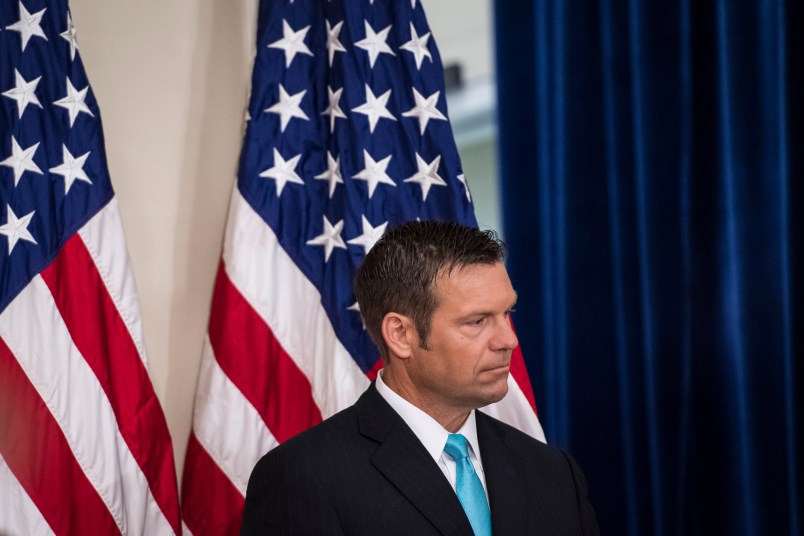Kansas Secretary of State Kris Kobach has shed light on what may be driving the Trump administration’s push to ask about citizenship in the 2020 Census.
In an op-ed written for Breitbart, Kobach endorses an approach to drawing voting districts in a way that would undermine the political power of immigrant-heavy communities. That approach, which culminated in a 2016 Supreme Court case, emerges from decades-old conservative opposition to the priniciple of “one person, one vote.”
Kobach, a Republican who led President Trump’s now-defunct voter fraud commission, is known for pushing restrictive voting laws.
In the op-ed, Kobach backs the idea of asking citizenship on the Census, something the Justice Department has also requested to be included on 2020 questionnaire. Kobach suggests that doing so would encourage states to draw districts based on number of citizens or some similar metric. Currently, states draw districts based on total population.
“If and when the citizenship question is ever returned to the census, and Congress considers excluding illegal aliens from the apportionment process, liberals in districts loaded with illegal aliens will protest that such aliens must be counted in apportionment,” Kobach wrote. “But that’s absurd, because a person who’s very presence in the United States is illegal — and who may return home or be deported at any time — cannot be considered a resident of the district in any meaningful sense.”
The question of whether districts should be drawn by total number of citizens or eligible voters, instead of total number of people was at the heart of the case that went to the Supreme Court, Evenwel v. Abbott. The lawsuit, spearheaded by conservative legal advocate Edward Blum, argued that Texas’ state legislative districts were unconstitutional because they were drawn based on total population.
Civil rights advocates feared that, if successful, the lawsuit would reduce the political power of immigrant communities.
The Supreme Court in 2016 ruled unanimously against Blum’s argument that states should be required to draw districts based on a metric other than total population. But the ruling didn’t require that states use total population. And a few conservative justices signaled they’d like to consider letting states use a different metric if the right case came before them.
Blum’s opponents argued, among other things, that there was not data accurate enough to draw districts based on citizens, rather than total population. Blum, and now Kobach, have suggested that including a citizenship question on the Census would help solve that problem.
In December, the Justice Department wrote a letter to the U.S. Census Bureau requesting that a citizenship question be included on the 2020 questionnaire. The letter cited enforcement of Section 2 of the Voting Rights Acts — which bars racially discriminatory voting policies — as its reason for seeking that data.
That rationale was met with skepticism by voting rights advocates, who noted that the Trump administration had defended several restrictive voting laws in cases where the challengers alleged the laws violated Section 2, reversing the Justice Department’s stance under the Obama administration. Enforcement of the Voting Rights Act gets only a passing passing mention in Kobach’s own endorsement of including a citizenship question on the Census.
The Justice Department declined to comment on Kobach’s suggestion of how Census’ citizenship data could change redistricting, and sent over a general statement from spokesman Devin M. O’Malley about its request for the question:
“Since 1965, every Census, with the exception of the one administered in 2010, has contained a citizenship question that provided data necessary for the Department of Justice to protect voters against racial discrimination. The Census Bureau continues to ask a citizenship question, but in recent years has moved that question to the American Community Survey, which—as the Census Bureau itself has recognized—is not the most appropriate data to use as a basis for redistricting. The Justice Department is committed to free and fair elections for all Americans and has sought reinstatement of the citizenship question on the Census to fulfill that commitment.”
In addition to the “one person, one vote” implications, civil rights activists fear the asking about citizenship will shift political power away from urban, minority communities and towards rural, red regions, because undocumented immigrants — and perhaps even their documented family members — will be less inclined to participate in the Census.
Updated: This story has been updated to include a statement from the Justice Department.







[Quote] In addition to the “one person, one vote” implications, civil rights activists fear the asking about citizenship will shift political power away from urban, minority communities and towards rural, red regions[/Quote] You mean more so than the Senate and Electoral College already do?
[Quote] “one WHITE person, one vote”
[/quote]
There, FIFY.
So all the illegal immigrants are clustered in liberal enclaves? They why give a shit? Aren’t you happy all the liberal enclaves give more in taxes and receive less in government benefits then the snowflake-heavy white conservative bastions with their immigration vapors, along with hosting those icky illegal immigrants?
We’re willing to take one for the team, and have a stronger bigger team in the end.
Interesting, the Constitution specifies a decennial census, but it makes no mention of questioning citizenship. It refers to counting “persons” (notwithstanding the now-superseded “Three-Fifths Compromise.”) Where does Kobach find this rule? Oh, yeah, he pulled it out of his ass.
“One Conservative White Person, One Vote”
FIFY even more!